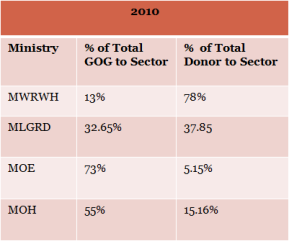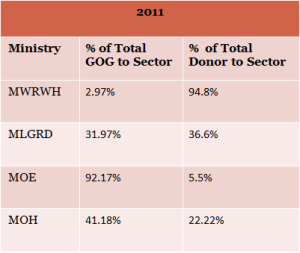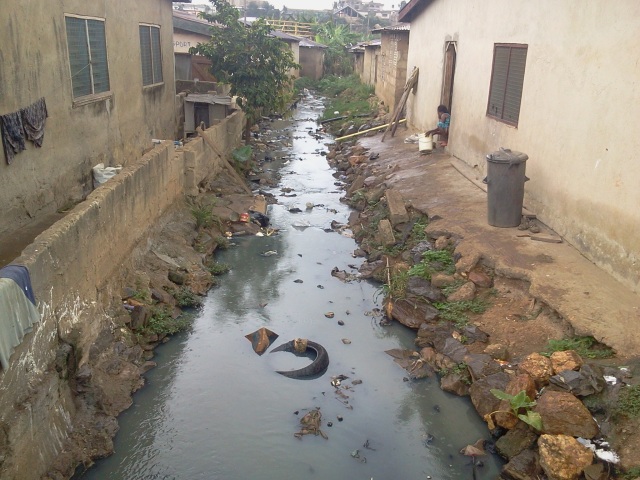 In this season of political manifestos and party election slogans, one might wonder if we have time to think about our environment. Of course we do! After all, it is the environment which holds us before elections, during elections and will hopefully hold us for many generations to come after elections if we care for it properly.
In this season of political manifestos and party election slogans, one might wonder if we have time to think about our environment. Of course we do! After all, it is the environment which holds us before elections, during elections and will hopefully hold us for many generations to come after elections if we care for it properly.
If you live in any city in Ghana, you might at some point have wondered why it’s been so hard for us to keep the place clean. There are heaps of rubbish all over and open gutters choked to the brim. We continually fail to address issues of water and sanitation in our swelling urban areas and so many live in cities but without running taps or flushing toilets. Ok, forget about if the toilet flushes or not, let’s just say without the existence of toilets. It’s quite an irony because we’ve set Millenium Develop Goal (MDG) targets and have got all the pretty policies to keep us on track. Supposedly there is a by-law in Accra that states that each household should have a toilet and if not the landlord would be sent to sanitation court. Yet it seems things can never stay clean and seaside defecation is still a norm for so many.
These are thoughts that continually run through my mind and at the end of August a lot of light was shed on the situation for me as I attended the MOLE Conference on Water and Sanitation. The theme of the conference was “Financing the WASH Sector: the past, current trends and vision for the future” and by the second day we had all come to the same conclusion. The country is a mess because the government just doesn’t want to pay for it to be better!
The fact is that WASH (Water, Sanitation and hygiene) is not a political priority so there is a lack of leadership when it comes to implementation, especially in the area of sanitation.
The UN MDG target for Ghana is that 54% of the population have access to improved sanitation by 2015 but we are currently at 14% and won’t meet our target because our progress has been so slow. Some district assemblies have water and sanitation projects in their plans but never allocate a budget so they don’t get done. At the national level the challenge is that a budget is allocated to water and sanitation but all the money gets spent on water and sanitation is barely touched. We are in an era where GDP is climbing but WASH sector contribution by government is declining.
The Foundation for Grassroots Initiatives in Africa, a Ghana-based NGO, presented its findings on its budget tracking of the Government of Ghana towards the WASH sector over 2009, 2010 and 2011. This was tracked through institutional coverage of the Ministry of Water Resources, Works and Housing (MWRWH) and all its water agencies (Ghana Water Company Limited (GWCL), Community Water and Sanitation Agency (CWSA), Water Resources Commission (WRC)), and the Ministry for Local Government and Rural Development (MLGRD) and its sanitation agency, Environmental Health and Sanitation Directorate (EHSD) plus the School Health Education Program (SHEP) under the Ghana Education Service (GES ). The general trend was that money allocated to the WASH sector by the government of Ghana was in fact on the decrease. A comparison of this allocation to the Ministry of Education (MOE) and the Ministry of Health (MOH) showed the following figures.
Interestingly enough, foreign donors to Ghana seem to be much more aware of how important sanitation is to Ghanaians than our own government. Even with figures from the Environmental Health and Sanitation Directorate (EHSD) revealing that poor sanitation costs Ghana 290 million dollars each year, our biggest contributors to providing water and sanitation services to Ghanaians remain outsiders.

 Again, as compared to education and health, we are willing to pay for most of it ourselves.To me the facts spell out that our government doesn’t spend on sanitation because it’s not a priority. And it’s not a priority because we don’t demand it. In every manifesto you will hear the promise of education, healthcare and boreholes but you wont hear the promise of toilets or the prevention of pollution because they know that won’t sell to us. It’s about time we realized that if our earth is polluted and we don’t have proper sanitation it eventually costs us a lot of money and we will be too sick and buried in rubbish to enjoy the free education or healthcare or whatever else the politicians have promised to cook up for us. Let’s get our priorities straight and stop being cheap. Demand for improved sanitation this election. It’s a life and death matter!
Again, as compared to education and health, we are willing to pay for most of it ourselves.To me the facts spell out that our government doesn’t spend on sanitation because it’s not a priority. And it’s not a priority because we don’t demand it. In every manifesto you will hear the promise of education, healthcare and boreholes but you wont hear the promise of toilets or the prevention of pollution because they know that won’t sell to us. It’s about time we realized that if our earth is polluted and we don’t have proper sanitation it eventually costs us a lot of money and we will be too sick and buried in rubbish to enjoy the free education or healthcare or whatever else the politicians have promised to cook up for us. Let’s get our priorities straight and stop being cheap. Demand for improved sanitation this election. It’s a life and death matter!





1) That picture gives me the creeps! Only God knows what disgusting vermin is in there! *shudder*
2) “Some district assemblies have water and sanitation projects in their plans but never allocate a budget so they don’t get done”
– how is that possible?
– are the funds ear-marked for water and sanitation projects b/c if so, then where is that money being siphoned to?
– if not, then why aren’t the funds being ear-marked? are these projects contingent upon the acquisition of funds?
LikeLike
Yes, the projects are contingent upon the acquisition of funds. From what I understand either the sanitation plans don’t make it to the budget or, in most cases, the finance department doesn’t release the funds early enough for something to actually get done before the fiscal year is over. Smh. Its an issue the ministry of finance really needs to address.
LikeLike
Some people might blame the habits of others as part of the problem. I don’t think so; we need the infrastructure in place to deal with our trash. We don’t have adequate facilities to handle our garbage. Zoom lion might be doing their best by providing free rubbish bins and garbage trucks and street cleaners but until the Government makes this a priority and provides funds to fully support this issue, the problem will simply get worse.
Give us rubbish bins throughout the city, that are continuously serviced, provide more workers to keep our streets and gutters clean, and develop a sewage system and laws to keep citizens in check; there’s a reason why countries like Singapore have clean streets. Their governments have made it a priority to provide the infrastructure and laws to keep their country clean. Green Ghanaian, I completely agree with you. Instead of our politicians making unrealistic promises like providing free SHS they should put their PR efforts towards bringing sanitation and hygiene to the forefront of our national agenda. This is why we elect them, to make Ghana a better country for all.
LikeLike
Jemyma,
In a way you have a point but one thing I know is that waste management is a business. The business does what will make profit for it. Zoomlion can ONLY do what the government mandates it to do and as you can see that’s not as much as we would like. The Ghanaian has the shameless habit of littering anything anywhere. We litter dirty diapers and soiled sanitary pads. YEAH. All in all you are right, the government needs to get more serious about it. There is serious revenue to be generated and jobs to be provided by enforcing environmental laws. I don’t get why the government of Ghana won’t do it. Its a win-win.
LikeLike
*sigh*. Let’s keep hoping that things will change. Let’s try to brighten the corner where we are. Great work, Green Ghanaian. God bless our homeland Ghana.
LikeLike
And make our nation great and strong!
LikeLike
Based on your the two charts you have given on the amount of money given to WASH, how accurate is it to say that funds are decreasing if you only propose stats form a one year period. I’m just playing the devil’s advocate but I thin more stats should be given in this context so that we can full understand what is going on with budgeting and exactly ho detrimental it is to the sanitation issue.
I also wanted to know if there are any other sanitation/waste management businesses in Ghana besides Zoom Lion. Does the government subsidize Zoom Lion for trash pick-up or are the a completely independent entity?
LikeLike
Thanks for the questions! I understand your angle and you make a great point. This research was conducted by Hawa Nibi Amenga-Etego of The Foundation for Grassroots Initiatives in Africa and from conversation with her such statistics are so hard to come by. These things aren’t published usually and it took for her to track down accountants and other public servants from office to office for months just to gather this. I think our government could do a better job of making itself more accountable by publicly posting such figures so that we could indeed make better comparisons but unfortunately government hasn’t taken that step.
There are other sanitation/waste management companies in Ghana besides Zoomlion although they have attempted to make a monopoly of the sector. There is City Waste Management, Jekora Ventures, J. Stanley Owusu Company and others. I think a post giving more exposure to these companies and what they do is necessary. From the information I have, Zoomlion is completely private and is contracted by the Waste Management Department of the AMA (for Accra) for waste collection in particular parts of the city. They sometimes do it themselves and sometimes sub-contract to other companies. Thanks so much for the feedback! Any other contributions?
LikeLike
Nope ! No other comments but your response is perfect and real reminder about the lack of transparency in governement. As someone just begining in my passion for Africa, especially the devlopment of Ghana I tend to forget the specific circumstances to consider. But anyway, love what youre wrting about and I’m so glad to see that others are just as passionate and invested in improving the sanitary conditions of Ghana. #VIM
LikeLike